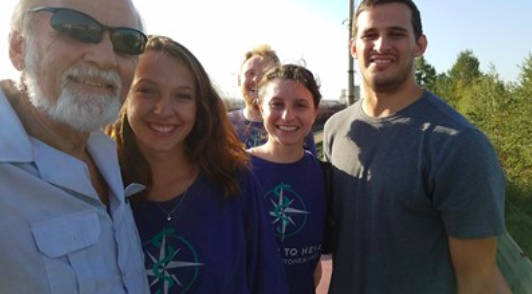
Mongolia 2018 Reflection: Go in Without Expectations (Lisa Pedevillano)
This Mission was my first with Mission to Heal, though not my first with Dr. Glenn. My previous encounter and introduction to the various adventures of Glenn Geelhoed, MD, etc., etc., etc. was two years ago, 2016, in Ghana and by mistake. What I mean by that is I happened upon Dr. Glenn going about his business, operating on those in need, while I was in a country with a different organization completely. At the time I was only able to spend a few days operating with him, and since that time have been eager to go on a trip start to finish. This voyage to Mongolia was the first attempt, and though I wasn’t able to stay until the end due to my own scheduling difficulties, it was an excellent first step. My experience in Mongolia caused me to re-think my previous experiences and motivating factors when it comes to surgical missions.
To give some background to the experience, I’ll describe how Mission to Heal came to Mongolia, to the best of my understanding. In fact, my understanding of the mission is crucial, perhaps more so than the reality of the situation (if there is a discrepancy), as it led to some important self-reflection throughout the mission. The Mongolian Railway company invited Mission to Heal to travel on a dedicated train to different cities in Mongolia, to provide medical, surgical, and in this case veterinary services. There was a possibility of bringing the new mobile surgical units, but that was thwarted by high shipping costs and unfavorable foreign NGO sentiments in Russia at the moment. My expectations were formed based on my last experience with Dr. Glenn, which entailed screening large numbers of patients and copious operating, and the above information. The first night of the mission, as we introduced ourselves to the group at large, I thought I’d use my past medical mission experience to impart some wisdom on the group: “go in without expectations.” I should have remembered this sage advice throughout the trip.
The Mongolian patients we treated were for the most part employees of the Mongolian Railway. This was a patient population with steady incomes and access to medical and surgical care. In fact, most patients were so well supported that they came in with imaging in-hand, and were often post-op from some procedure or other done in Korea. We were largely screening patients with arthritis and aches and musculoskeletal complaints stemming from the manual labor of their Railway jobs. Curiously, routine abdominal ultrasound seemed to be the rule, not the exception, and many people with asymptomatic cholelithiasis were coming in expecting a cholecystectomy. That is apparently common practice in Mongolia, but certainly not standard of care in the US.
This patient population did not meet my expectations in terms of perceived need, and I found that very challenging at first, though ultimately it led to some introspection and self-examination. I was disappointed that the patients were not the rural, nomadic Mongolians I had expected. I was unhappy that instead of swooping in to provide surgical care to the needy, we seemed to be providing second opinions and Voltaren Gel to people with access to plenty of medical services. Had we been “hired” by the Railway just to bring free, “better” care to their employees? This seemed to be less an exercise in altruism than slave labor (albeit voluntary). So, I had to ask myself why I had come to Mongolia. I had to examine my motivations and wonder why having patients that were able to receive medical and surgical care already irritated me. Was it that they weren’t sick enough for me? Did I begrudge these patients because they weren’t poor enough? Was I worried that the story I’d have to tell the people at home wouldn’t match with the things I’d said before I left?
The answers to these questions came to me as the days went on. I found that a major part of our service to the country was in educating the medical professionals already in Mongolia. I knew this was a crucial aspect of M2H’s objectives for any mission, and it is something I support and admire. However, I had yet to put it into practice. This was not my first mission, but it was the first time I felt able to teach while on one. It was immensely gratifying to feel like I could lead by example and share my training with others just by practicing the way I’d always done in the US. As for the type of patient, the population we were presented with changed as the days went on, and the Railway company seemed to do some pre-screening for us. However, the idea that every patient deserves to be listened to and taken seriously no matter what the complaint is – that no patient should be considered “too unsick” for our attention, was a lesson I had to learn as the mission progressed. It was not the job of the Mongolian Railway to entertain us with severe cases, they were sending us their employees to be treated. Persons in need come in all shapes and socioeconomic situations.
This mission taught me that although I have gone on several medical and surgical missions before, there will always be lessons to learn, and they may change as I change and grow throughout my career. This is hopefully the first of many reflection papers I’ll write for Mission to Heal.
Like us on Facebook and watch our video to learn more about our Mongolia 2018 trip here.